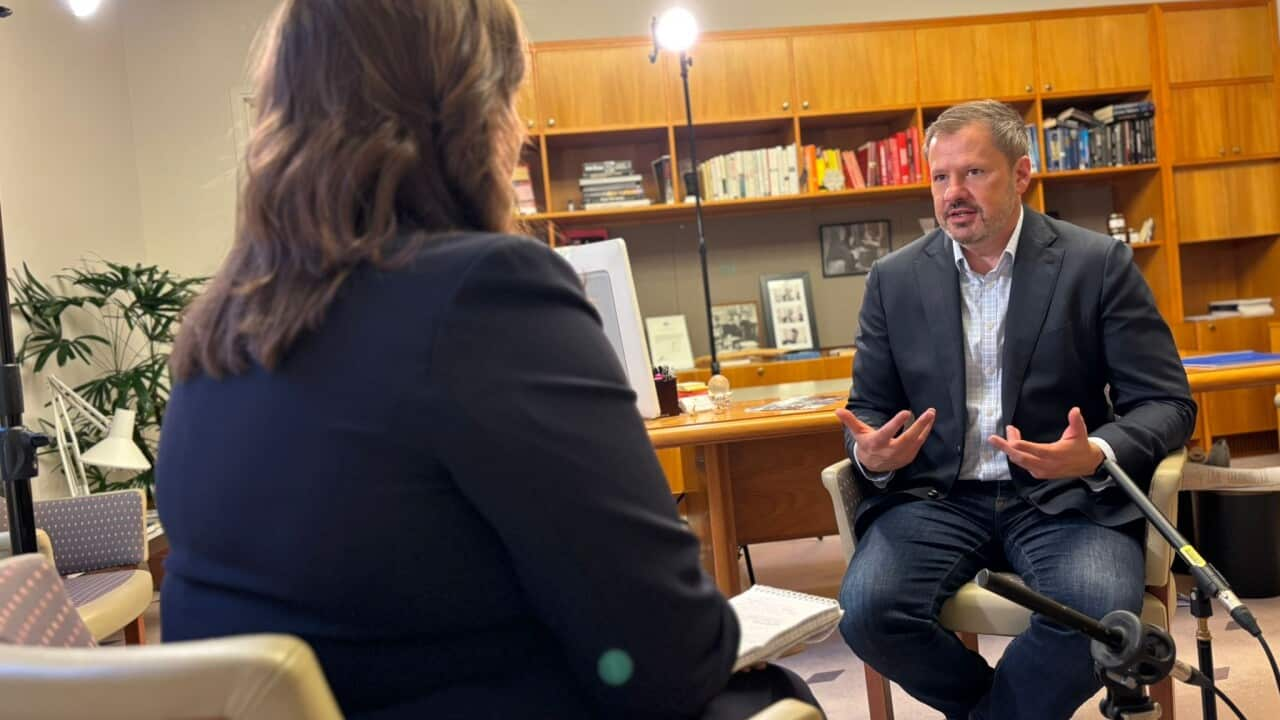TRANSCRIPT
Since 2019, Dr Fan Yang from the University of Melbourne has been studying misinformation - incorrect information - about Australian elections on Chinese super app, WeChat.
Owned by tech giant Tencent, it's an app of everything - where you can not only message friends, but also share posts, follow media outlets and watch short videos.
But for Dr Yang, who will be monitoring the platform for third consecutive federal election, it's a place for disinformation - deliberately incorrect information.
"We're under-prepared to address or intervene disinformation and misinformation being circulated within either Chinese English-speaking communities or non-English speaking communities."
Since the 2016 federal election, there have been concerns that WeChat has been flooded with misinformation about major parties, policies and even how to vote.
There've also been reports of disinformation.
According to the 2021 census, almost one in five Australians speak a language other than English at home.
Many of them use non-English social media platforms such as WeChat.
A 2023 report by the Lowy Institute shows over half of Chinese-Australians aged 18 to 44 use WeChat daily.
In recent years, another China-owned social app, RedNote, has gained popularity, with more than half of the Chinese population in Australia actively using the app.
Dr Yang says even with the increased number of non-English social apps in Australia, there's still no systemic approach to regulation.
“Disinformation and misinformation online, circulated around non-English speaking communities, or circulated within closed, private channels, has long been overlooked by Australian regulatory bodies and also national media outlets.”
And even when the federal government has looked at regulating misinformation it hasn't extended to non-English platforms.
“We compared the two versions of combating misinformation, disinformation bill in 2023 and 2025 and we found that non English language disinformation, misinformation sources was not included into the bill at all, and the bill also didn't target non-American social media services or non-popular, non-mainstream social media services such as WeChat, RedNote, etc. And also, the bill was abandoned by the government in November 2024.”
So how difficult it is to reduce the effects of misinformation?
After going through thousands of posts containing misinformation, Dr Yang says there are often common themes.
“A lot of the disinformation narrative that we have been observing and have been collecting, they are quite repetitive, which means if we want to devise strategies to pre-bunk (preemptively warn people about) disinformation narratives, we can do that. But so far, I don't see lots of resources devoted or invested in debunking or prebunking disinformation at this stage.”
Dr Yang says many community members rely on their families to fact-check information online, usually relying on the younger, digitally savvy family members who speak fluent English.
But before being able to debunk misinformation, people need to know how the electoral system works, and that's not always the case in Australia.
A recent report by the Australian Curriculum, Assessment and Reporting Authority shows only one in four Year 10 students are proficient in civic literacy, which covers concepts like democracy, how to make laws, and the roles of governments.
Recent research co-authored by Dr Yang shows over half of Chinese migrants don't know how Australia's political system works, with just under half of South Asian migrants saying the same thing.
That's also what Hong Kong migrant and podcaster Suie Lo found when producing a Cantonese children's podcast on misinformation.
Ms Lo arrived in Melbourne three years ago.
Having followed the heated discussions on misinformation, she feels it's necessary to help kids understand the idea of fact-checking.
“Nowadays, we all know, after 2000, every kid was born in a internet world. And even as a parent, we cannot control every information provided by the internet when your kid grows up. So it is really important to let the kids know they need to know how to justify or how to figure out which information may not be that reliable, or may be misleading.”
Before she could deliver the content to the children of the Cantonese community, Ms Lo herself had to first master the skill of identifying fake news.
“My story is only one of an insight or idea to give the kids and the parents awareness of the misinfo or the information for the internet. So if the parents want to discuss with kids more deeply, they need to have more concrete ideas and concepts. I know that the government establish a department, it's about e-safety, and then they provide some information and also some classes for teachers to guide the kids about the digital world.”
Besides the e-safety commissioner, the Australian Electoral Commission has been conducting civic education workshops in multicultural communities.
AEC spokesperson Evan Ekin-Smyth says it's been a focus as the election approaches.
“We have a number of in language facilitators who've been doing it in various areas. A lot of it's been in Western Sydney, but there's also areas across Victoria and some other places as well a range of different languages. It's about community need and identification of, you know, desire from community members to have this information. Typically, it looks like, you know, renting out a room in a council building, or whatever it might be, inviting local community members to come, and you might get 10 people, or 15 or 20 or whatever it is, and you have a conversation about Australia's voting system in language, and you provide resources and materials.”
Last federal election, the AEC collaborated with some major WeChat channels to publish Chinese translations of its official materials.
In February, it met with WeChat to develop a referral pathway on the platform over election misinformation.
But Mr Ekin-Symth says it's challenging to keep up with rapidly changing landscape.
“It's a tricky space. This is not just in-language channels, this is all channels. The proliferation of social media channels has been significant, particularly over the last few years, there is a limit to the amount of places that we can go and the amount of money we can spend on advertising and the sort of presence that we can maintain on different channels.”
For this election, the AEC has a message to all voters: stop and think about the information you see online.
“And there's really some questions that voters need to ask themselves when they're seeing things about whether something is current, whether it's legitimate, and I would recommend that people check multiple sources of information, because that's the best thing that somebody can do to protect themselves.”













